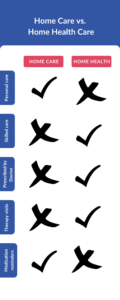While looking for care for yourself or a loved one, you’ve no doubt heard the terms “home care” and “home healthcare.” These terms are often confused, but they have very different meanings and knowing the difference can help you navigate the healthcare system and secure the services you need.
What is home care?
Home care refers to non-medical services provided in the home. These services, sometimes called personal, unskilled, in-home or companion care, help individuals with activities of daily living – such as bathing, dressing, cooking and transportation. Home care services are often used by older adults and those recovering from an illness, injury or surgery.
Mothers who are dealing with difficult pregnancies or have recently given birth can benefit from various home care services, including meal preparation (considering nausea, gestational diabetes or high blood pressure), light housekeeping, post-op C-section care and assistance with walking, moving or bathing.
Home care services are commonly provided by home health aides (HHAs), Certified Nursing Assistants (CNAs) and, in some cases, family members. Families generally pay for home care out of pocket or with long-term care insurance.
Medicare normally does not cover the cost of home care – however, there are exceptions. For example, if an individual needs personal care services in addition to home healthcare, some may be covered by Medicare. Because patients generally pay for care themselves, there are no eligibility requirements, and care can continue for as long as it is needed and your budget allows.
Home care services
Home care is designed to make daily life easier for individuals who need extra assistance. Services often include:
- Help with bathing and toileting
- Assistance with dressing and grooming
- Light housekeeping and other chores
- Meal preparation and feeding
- Medication reminders
- Help with walking, getting in and out of bed or chairs
What is home healthcare?
Home healthcare refers to skilled medical services provided by RNs, LPNs, LVNs and therapists in the home. Home healthcare is usually delivered to children and adults with chronic and serious diseases or conditions or recovering from major surgery or injury. Individuals who take advantage of home healthcare receive the same quality of care they would receive in a hospital or skilled nursing facility at a lower cost and in the comfort of their own homes.
You need a referral from your doctor or practitioner to qualify for home healthcare. Once you have a referral, you can look for the best home health agency for your needs. Medicaid, Medicare and some private insurance plans generally cover home healthcare. Unlike home care, home healthcare depends on doctor’s orders, is subject to eligibility requirements, and lasts as long as your doctor certifies.
Home healthcare services
Home healthcare is intended to assist with more serious conditions. You can expect your nurse to help with the following:
- Intravenous or nutrition therapy
- Ventilator and tracheostomy care
- Diabetes management
- Seizure management
- Medication and therapy administration
- Care coordination
- Patient and family education
Maxim’s services
Although they are different services, there are many situations in which home care and home healthcare go hand in hand. For example, someone recovering from a major surgery may need help with everyday tasks and skilled nursing care to promote recovery. Luckily, Maxim Healthcare Services provides both home care and home health services to our patients.
Adult patients commonly use intermittent skilled nursing, personal care and private duty nursing services. Private duty nursing (PDN) is frequently used by individuals with traumatic injuries and progressing degenerative diseases such as ALS. Learn more about Maxim’s PDN services. Patients and their families have access to on-call support 24/7/365. Adults under our care can receive the support they need to heal and remain independent.
Pediatric patients don’t typically use personal care services, as they have parents or guardians to manage their households. However, they take advantage of our intermittent skilled nursing, private duty nursing, therapy and behavioral services. Receiving care in their homes and other familiar settings allows children to spend time with their parents and family members instead of in the hospital. Pediatric care services are intended to help children live fuller lives and make the most of their childhoods.
Knowing the difference between home care and home healthcare can save you a great deal of confusion and stress when securing care for yourself or a loved one. Maxim Healthcare Services is proud to provide home health and home care services to our communities. Getting the right assistance can make all the difference during difficult times, so don’t hesitate to contact your local Maxim office to find out about the services available near you.




